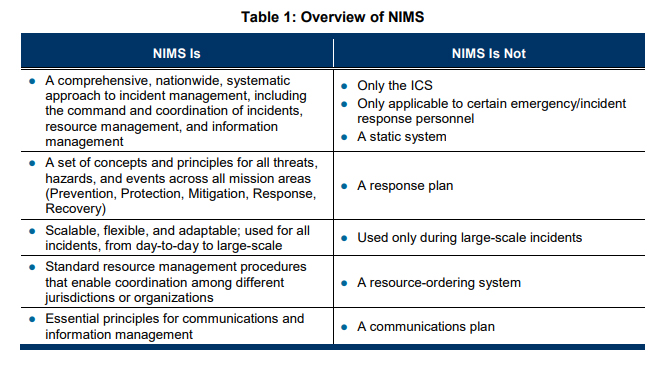In this article’s slideshow, we give actual questions from the Final Exam of the NIMS course IS-800 D National Response Framework, An Introduction. But what is the National Response Framework (NRF)?
The National Response Framework is a “companion document” to the National Incident Management System or NIMS. In the following sections, we present guiding principles and a basic premise of the National Response Framework.

(Source: https://www.fema.gov/sites/default/files/2020-07/fema_nims_doctrine-2017.pdf)
As many of you know, NIMS was created by the Department of Homeland Security to improve coordination between incident responders. The Federal Emergency Management Agency (FEMA) describes the distinction between NIMS and the National Response Framework (NRF) like this:
“While NIMS provides the template for the management of incidents regardless of size, scope or cause, the NRF provides the structure and mechanisms for national-level policy of incident response… A basic premise of the National Response Framework is that incidents are generally handled at the lowest jurisdictional level possible.”
While some may think “national level” means only government officials can get value out of NRF, FEMA designed the NRF for emergency management practitioners and leaders in the private-sector and nongovernmental organizations (NGO) as well as government executives.
Below we give a quick overview of the course. If you’re a NIMS veteran and just want to test your knowledge, feel free to skip right to the quiz! If you get stumped, you can try finding information that reveals some of the final exam answers below.
TAKE THE QUIZ NOW
What is The National Response Framework?
The National Response Framework describes key principles, roles and structures in an all-hazards emergency response, including how communities, government entities, the private and public sectors coordinate their response.
The National Response Framework focuses on response and short-term recovery instead of all of the phases of incident management.
According to the IS-800 D National Response Framework, An Introduction course, to assist response partners in effectively carrying out the mission of response, the National Response Framework:
- Identifies capabilities that are essential for response and community lifelines stabilization
- Indicates the actions necessary to build and deliver the required capabilities
- Describes key roles and responsibilities for integrating capabilities across the whole community
- Outlines how the Response mission area relates to other mission areas
National Response Framework Guiding Principles

Figure 2: Tiered response hierarchy (Source: IS-0800 D: National Response Framework, An Introduction course overview)
The Framework presents the guiding principles that enable all response partners to prepare for and provide a unified national response to disasters and emergencies – from the smallest incident to the largest catastrophe. The five key principles of the Framework are listed below.
- Engaged partnership: Leaders at all levels align response goals and capabilities.
- Tiered Response: Incidents should be managed at the lowest possible jurisdictional level and supported when needed (see Figure 2). A basic premise of the National Response Framework is that incidents are generally handled at the lowest jurisdictional level possible. Incidents begin and end locally. And most incidents are managed entirely at the local level.
- Scalable, flexible and adaptable operational capabilities.
- Unity of effort through unified command. Unity of effort respects the chain of command of each participating organization while harnessing seamless coordination across jurisdictions in support of common objectives.
- Readiness to act. It is our collective duty to respond as effectively as possible.
Who Should Take National Response Framework, An Introduction?
As mentioned above, the NRF course is designed for private-sector and nongovernmental organization leaders, emergency management practitioners and government executives. There are no prerequisites necessary.
In general, everyone involved in emergency management should take the NIMS baseline courses (IS-700 and ICS-100). The National Integration Center (NIC) recommends that individuals with a command and general staff role take advanced courses.
After completing the course National Response Framework, An Introduction, you should understand and be able to describe the following:
- The purpose of the National Response Framework and its response doctrine
- The roles and responsibilities of response partners
- The actions supporting national response
- The response organizations used for multiagency coordination
- The relationships between emergency planning and national preparedness
The National Response Framework Exam
The short quiz in the slideshow uses real questions from the National Response Framework, An Introduction Final Exam. If you get a good score on this, you might as well take the Final Exam (you need at least a 75% from FEMA to pass). Good luck!












